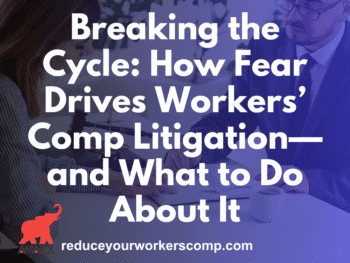“Exclusive Liability” Clauses: One Narrow/One Broader
The narrow type, sometimes referred to as the “Rhode Island” type, says that the employee’s rights under the workers’ compensation act shall be “in lieu of all rights and remedies as to that injury now existing, either at common law or otherwise against an employer.”
Click Link to Access Free PDF Download
“Avoid the 3 Primary Reasons Injured Workers’ Hire Attorneys”
The broader type, reflected in New York (and other states) carries things one step further by specifying that the excluded actions include those by “such employee, his personal representatives, husband, parents, dependents or next of kin, or anyone otherwise entitled to recover damages, at common law or otherwise on account of such injury or death.” Larson’s Workers’ Compensation Law: Chapter 101, which deals with exclusiveness as to persons other than the employee, is being revised and updated for the June 2010 release.
The effect of such an exclusiveness rule can be particularly problematic for non-dependent relatives. For example, in Alonzi v. Northeast Generation Servs. Co., 156 N.H. 656, 949 A.2d 1153 (2008), the Supreme Court of New Hampshire held that the death benefit provision of N.H. Rev. Stat. Ann. § 281-A:26(IV) which, inter alia, provides only a limited remedy to the estates of dependent-less decedents who are killed at work, did not offend the equal protection guarantee of the New Hampshire Constitution since the statute served an important government interest and balanced the competing needs of employers and employees. (workersxzcompxzkit)
Somewhat similarly, in Saab v. Massachusetts CVS Pharm., LLC, 452 Mass. 564, 896 n.e.2D 615 (208), the court held that the parents of an employee who died in a work-related accident could not maintain a wrongful death action against the successor in interest to their son’s employer in spite of the fact that since they were not dependent upon the son, they could not recover any death benefits under the Massachusetts Workers’ Compensation Act [see Larson’s Workers’ Compensation Law: Ch. 101, § 101.02[1] Digest, n6].
© Copyright 2010 LexisNexis. All rights reserved. This material is excerpted from Larson’s Workers’ Compensation Law. Reprinted with permission.
FREE WC IQ Test: http://www.workerscompkit.com/intro/
WC Books: http://www.reduceyourworkerscomp.com/workers-comp-books-manuals.php
WC Calculator: http://www.reduceyourworkerscomp.com/calculator.php
Do not use this information without independent verification. All state laws vary. You should consult with your insurance broker or agent about workers’ comp issues.
©2010 Amaxx Risk Solutions, Inc. All rights reserved under International Copyright Law. If you would like permission to reprint this material, contact Info@WorkersCompKit.com



























